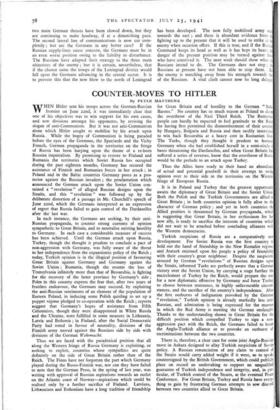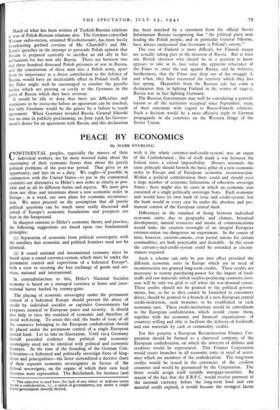COUNTER-MOVES TO HITLER
By PETER MATTHEWS WHEN Hitler sent his troops across the German-Russian frontier on June 22nd, it was immediately clear that one of his objectives was to win support for his own cause, and sow divisions amongst his opponents, by reviving the slogan of anti-Communism. But it was not anti-Communism alone which Hitler sought to mobilise by his attack upon Russia. While the bogey of Communism is being paraded before the eyes of the Germans, the Spaniards and the Vichy French, German propaganda in the territories on the fringe of Russia has been harping upon the theme of a re-born Russian imperialism. By promising to restore to Finland and Rumania the territories which Soviet Russia has occupied during the past eighteen months, Germany has secured the assistance of Finnish and Rumanian forces in her attack ; in Poland and in the Baltic countries Germany poses' as a pro- tector against the Russian invaders ; the proclamation which announced the German attack upon the Soviet Union con- tained a " revelation " of alleged Russian designs upon the Straits, and this " revelation " was followed up by the deliberate distortion of a passage in Mr. Churchill's speech of June 22nd, which the Germans interpreted as an expression of regret that Russia failed to gain control of the Dardanelles after the last war.
In each instance, the Germans are seeking, by their anti- Russian propaganda, to counter strong currents of opinion sympathetic to Great Britain, and to neutralise existing hostility to Germany. In each case a considerable measure of success has been achieved. Until the German attack upon Russia, Turkey, though she thought it prudent to conclude a pact of non-aggression with Germany, was fully aware of the threat to her independence from the expansionist policy of the Reich ; today, Turkish opinion is in the illogical position of favouring Great Britain against Germany and Germany against the Soviet Union ; Rumania, though she resents the loss of Transylvania infinitely more than that of Bessarabia, is fighting for the recovery of the latter province by Germany's side ; Poles in this country express the fear that, after two years of fruitless endeavour, the Germans may succeed, by exploiting the anti-Russian sentiments of an element of the population of Eastern Poland, in inducing some Polish quisling to set up a puppet regime pledged to co-operation with the Reich ; reports suggest that Germany's hopes of assistance from Fifth Columnists, though they were disappointed in White Russia and the Ukraine, were fulfilled in some measure in Lithuania, Latvia and Esthonia ; in Finland, after the Social Democratic Party had voted in favour of neutrality, divisions of the Finnish army moved against the Russians side by side with divisions of the German Wehrmacht.
Thus we are faced with the paradoxical position that all along the Western fringe of Russia Germany is exploiting, or seeking to exploit, countries whose sympathies are quite definitely on the side of Great Britain rather than of the Reich. The Finns have not forgotten the part which Germany played during the Russo-Finnish war, nor can they have failed to note that the German Press, in the spring of last year, was writing with approval of Russian aspirations towards an outlet on the Atlantic coast of Norway—aspirations which could be realised only by a further sacrifice of Finland Latvians, Lithwanians and Esthonians have a long tradition of friendship for Great Britain and of hostility to the German " Baltic Barons." No country has so much reason as Poland to desm the overthrow of the Nazi Third Reich. The Rumania people can hardly be expected to feel gratitude to the Reid for having first permitted the dismemberment of their counm by Hungary, Bulgaria and Russia and then tardily intervened to win back Bessarabia at a heavy cost in Rumanian lives The Turks, though they thought it prudent to humow Germany when she had established herself in a semi-circle ol bases threatening the Dardanelles, and when Great Britain had suffered a series of reverses, know that the overthrow of Russil would be the prelude to an attack upon Turkey.
Thus the Allies have ready to their hand an abundance of actual and potential goodwill in their attempt to swing opinion over to their side in the territories on the Western fringe of European Russia.
It is in Poland and Turkey that the greatest opportunity awaits the diplomacy of Great Britain and the Soviet Union Both the Polish and the Turkish Governments are allied to Great Britain ; in both countries opinion is fully alive to the character of German policy ; and yet in both countries the Allied position is threatened by German propaganda, which is suggesting that Great Britain, in her enthusiasm for her new ally, is ready to sacrifice the interests of countries which did not wait to be attacked before concluding alliances with the Western democracies.
Turkish suspicions of Russia are a comparatively new development. For Soviet Russia was the first country to hold out the hand of friendship to the New Kemafist regime, and Ataturk enjoined upon his people a policy of friendship with their country's great neighbour. Despite the suspicion aroused by German " revelations " of Russian designs upon the Straits, informed Turks are perfectly aware that a German victory over the Soviet Union, by carrying a stage further the encirclement of Turkey by the Reich, would prepare the way for a new diplomatic offensive by Germany and force Turkey to choose between resistance, in highly unfavourable circum- stances, and the sacrifice of the country's independence. Alta the first outbursts of indignation provoked by the German "revelation," Turkish opinion is already markedly less anti- Russian, and admiration is being expressql for the manner in which the Red Army is meeting the German onslaught Thanks to the understanding shown in Great Britain for the difficult position which compelled Turkey to sign a non- aggression pact with the Reich, the Germans failed to break the Anglo-Turkish alliance or to provoke an outburst of recriminations between the two countries.
There is, therefore, a dear case for some joint Anplo-Russian move in Ankara designed to allay Turkish suspicions of Soviet policy. A Russian renunciation of any claim to control of the Straits would carry added weight if it were, so to speak, countersigned by the British Government, which could publicly place on record an undertaking to support an unqualified guarantee of Turkish independence and integrity, and, in par- ticular, of Turkish control of the Straits, at the eventual Peace Conference. For Great Britain, Turkey and Russia have every- thing to gain by frustrating German attempts to sow discord between two countries allied to Great Britain. Much of what has been written of Turkish-Russian relations true of Polish-Russian relations also. The German-controlled Warsaw radio-station, renamed Weichselsender, has been busily broadcasting garbled versions of Mr. Churchill's and Mr. Eden's speeches in the attempt to persuade Polish opinion that Britain is prepared cynically to sacrifice an old ally in her enthusiasm for her new ally Russia. There are between two and three hundred thousand Polish prisoners of war in Russia, and the constitution of these men into a Polish army, apart from its importance as a direct contribution to the defence of Russia, would have an incalculable effect in Poland itself, for the Poles might well be encouraged to emulate the guerilla tactics which are proving so costly to the Germans in the parts of Russia which they have overrun. It would be idle to deny that there are difficulties and suspicions to be overccme before an agreement can be reached, but only Germany would be the gainer by a failure to reach agreement. When Germany invaded Russia, General Sikorski lost no time in publicly proclaiming, on June 23rd, his Govern- ment's desire for an agreement with Russia, and this declaration has been matched by a statement from the official Soviet Information Bureau recognising that "the political party now leading the Polish people, and in particular General Sikora, have always understood that Germany is Poland's enemy."
The case of Finland is more difficult, for Finnish troops are actually taking part in the invasion of Russia. But at least one British observer who should be in a position to know appears to take at its face value the apparent reluctance of the Finns to enter the war against Russia, and he believes, furthermore, that the Finns may drop out of the struggle if, and when, they have recovered the territory which they lost last spring. Meanwhile from the Russian side has come a declaration that, in fighting Finland in the winter of 1940-1, Russia was in fact fighting Germany.
The Russian Government may well be considering a general- isation to all the territories occupied since September, 1939, of their statement with regard to Russo-Finnish relations. Such a decision would be a most effective reply to German propaganda in the countries on the Western fringe of the Soviet Union.



























 Previous page
Previous page